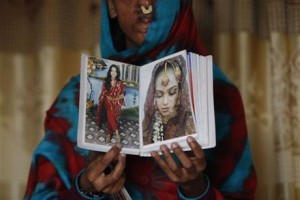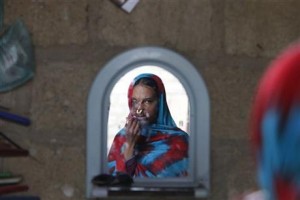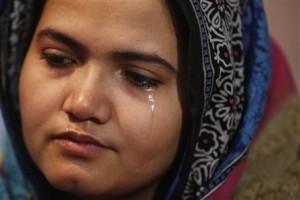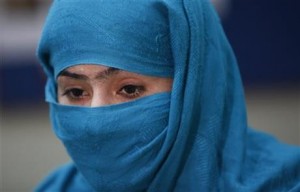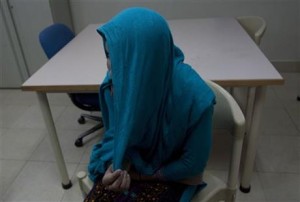Kainat Soomro was 13 years old and on her way to buy a toy for her newborn niece when three men kidnapped her, held her for several days and repeatedly raped her.
Eight years later, she is still battling for justice. She sits on a steel-framed bed in her parents’ three-bedroom home, and holds her blue shawl tight around her body. When she describes the horror of her captivity, her voice is barely a whisper, but it gains strength when she talks of the fight she has been waging: going to Pakistan’s courts, holding protests, rejecting the rulings of the traditional Jirga council, taking on the powerful landlord and politician who she says are protecting her attackers.
The Associated Press does not usually identify victims of sexual abuse, but Kainat has gone public with her case. Her battle for justice has inspired an award-winning 2014 movie, “Outlawed in Pakistan.” Malala Yousefzai, the Pakistani teenage Nobel Peace Prize winner who was shot by the Taliban, invited Kainat to the Nobel award ceremony, and her fund has given Kainat financial help.
Yet Kainat’s family has paid a high price for her bravery. One sister remains unmarried and another was divorced because her in-laws were ashamed to be associated with Kainat. In 2010, her brother was killed over his sister’s refusal to stay silent.
Clutching a gold-framed picture of his son, Ghulam Nabi Soomro spat out words of condemnation. “They know about our troubles thousands of miles away but here in the next street no-one is helping us get justice,” he said.
In Pakistan, women are often too fearful to report sexual violence, yet the independent Human Rights Commission of Pakistan recorded 423 rapes and 304 gang rapes last year. It also said that last year at least one woman a day was killed in the name of honor — murdered for allegedly bringing shame on the family.
“Each year a gamut of promises is made for the protection and development of women, but (they) remain unfulfilled by the year-end,” the commission wrote in its 2014 annual report.
Attackers are rarely jailed. Human rights workers say the police often refuse to even register a case involving attacks against women, and the powerful and rich are immune.
The groups trying to advance women’s rights in Pakistan’s deeply traditional patriarchal society suffered a painful blow last month when the national parliament refused to pass laws banning child marriage. The parliament buckled to the dictates of the Islamic Ideology Council, a religiously right-wing advisory group with no legal authority. The same body has also said that taking DNA tests to identify a suspected rapist is against Islam.
“Women’s groups have been demanding that the Islamic Ideology Council be disbanded,” says Uzma Noorani, an activist who also operates a women’s shelter in Pakistan’s port city of Karachi.
She says rights advocates are fighting a war for change and occasionally battles are won. Southern Sindh province, of which Karachi is the capital, has passed legislation aimed at protecting women and banning underage marriages. But then the war begins again as they fight to convince police and judges to register cases and implement the laws, and to take authority away from the Islamic Ideology Council and other hard-line groups.
“When you have a law it is like a weapon, when you need it you can use it,” says one outspoken member of Sindh’s legislature, Mahtab Akbar Rashdi.
She says that the national government is pandering to those who adhere to a narrow and restrictive view of Islam, which mostly targets women. “It’s as if women for them are the biggest problem in Islam,” she says of the Islamic Ideology Council.
One women’s shelter in Karachi, surrounded by two walls and protected by guards, is home to around 40 women. Some have fled abusive husbands, some have been raped, others are being hunted down by families for choosing love.
When Azra was 18, her family sold her for $5,000 to an older man who passed her around to strangers. She ran away, and now she is fighting for a divorce and too afraid to leave the shelter’s walls. The court have yet to decide on her case and Azra — who is just 20 — wonders where she will go when the time comes to leave the shelter.
Sidra Kanwal had left her abusive husband and moved back in with her mother when another man proposed to her. The man refused to take no for an answer. He pestered her and harassed her. And then one day he told her that if couldn’t have her, no one could, and threw acid in her face.
The months afterward were horrific. Her poverty meant doctors paid her little heed. One sent her home with only burn cream, but the pain and swelling were unbearable. Her nostrils had seared together. She returned to hospital and again, after three days, they sent her home.
Her four-year-old son refused to come to her after her attack. “He didn’t recognize me. My face scared him,” she says, pulling her headscarf over her twisted mouth and nose.
Nightmares haunt her sleep. Each time she closes her eyes, his face appears. Sometimes he is hitting her, throwing more acid, pounding her. If her terror does not waken her, the small tube that runs between her burnt nostrils does. Without it, she struggles to breathe.
It was not until she went to court that Noorani, the women’s rights activist, saw her and she received treatment. According to the Human Rights Commission, 55 acid attacks took place in Pakistan last year. To date, only 17 arrests have been made.
Unlike Kainat or Azra, Sidra’s attacker is in jail, but his family has been embraced by the neighbors. The family jeers at her, and the neighbors applaud. Sidra, with her painfully disfigured face, is the outcast.
___
This story has been corrected to show that Sidra’s surname is Kanwal, not Kamwal.
